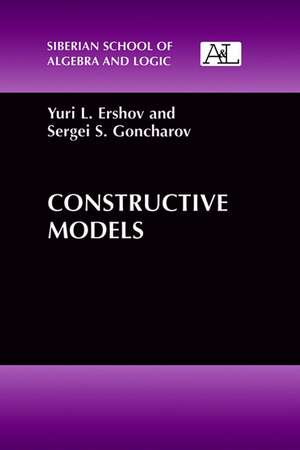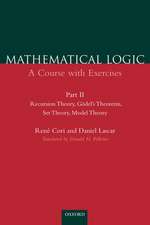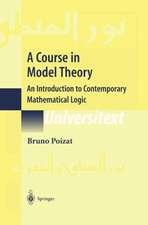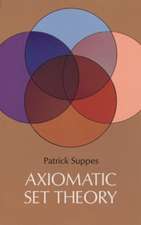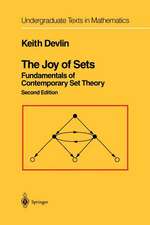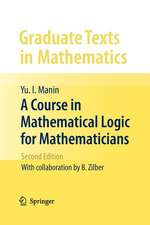Constructive Models: Siberian School of Algebra and Logic
Autor Yuri L. Ershoven Limba Engleză Hardback – 31 mar 2000
This book is a very readable exposition of the modern theory of constructive models and describes methods and approaches developed by representatives of the Siberian school of algebra and logic and some other researchers (in particular, Nerode and his colleagues). The main themes are the existence of recursive models and applications to fields, algebras, and ordered sets (Ershov), the existence of decidable prime models (Goncharov, Harrington), the existence of decidable saturated models (Morley), the existence of decidable homogeneous models (Goncharov and Peretyat'kin), properties of the Ehrenfeucht theories (Millar, Ash, and Reed), the theory of algorithmic dimension and conditions of autostability (Goncharov, Ash, Shore, Khusainov, Ventsov, and others), and the theory of computable classes of models with various properties.
Future perspectives of the theory of constructive models are also discussed. Most of the results in the book are presented in monograph form for the first time.
The theory of constructive models serves as a basis for recursive mathematics. It is also useful in computer science, in particular, in the study of programming languages, higher level languages of specification, abstract data types, and problems of synthesis and verification of programs. Therefore, the book will be useful for not only specialists in mathematical logic and the theory of algorithms but also for scientists interested in the mathematical fundamentals of computer science.
The authors are eminent specialists in mathematical logic. They haveestablished fundamental results on elementary theories, model theory, the theory of algorithms, field theory, group theory, applied logic, computable numberings, the theory of constructive models, and the theoretical computer science.
| Toate formatele și edițiile | Preț | Express |
|---|---|---|
| Paperback (1) | 1217.41 lei 6-8 săpt. | |
| Springer Us – 28 sep 2012 | 1217.41 lei 6-8 săpt. | |
| Hardback (1) | 1223.55 lei 6-8 săpt. | |
| Springer Us – 31 mar 2000 | 1223.55 lei 6-8 săpt. |
Preț: 1223.55 lei
Preț vechi: 1492.14 lei
-18% Nou
Puncte Express: 1835
Preț estimativ în valută:
234.20€ • 254.48$ • 196.86£
234.20€ • 254.48$ • 196.86£
Carte tipărită la comandă
Livrare economică 21 aprilie-05 mai
Preluare comenzi: 021 569.72.76
Specificații
ISBN-13: 9780306110665
ISBN-10: 0306110660
Pagini: 293
Ilustrații: XII, 293 p.
Dimensiuni: 155 x 235 x 19 mm
Greutate: 0.61 kg
Ediția:2000
Editura: Springer Us
Colecția Springer
Seria Siberian School of Algebra and Logic
Locul publicării:New York, NY, United States
ISBN-10: 0306110660
Pagini: 293
Ilustrații: XII, 293 p.
Dimensiuni: 155 x 235 x 19 mm
Greutate: 0.61 kg
Ediția:2000
Editura: Springer Us
Colecția Springer
Seria Siberian School of Algebra and Logic
Locul publicării:New York, NY, United States
Public țintă
ResearchCuprins
1. Models, Computability, and Numberings.- 1.1. Algebraic Systems, Models, and Theories.- 1.2. Notions and Definitions of Algorithm Theory.- 1.3. The Main Notions and Results of Numbering Theory.- 1.4. Numbered Algebraic Systems.- 2. Constructive Models.- 2.1. The Simplest Properties.- 2.2. Existence of Constructivizations.- 2.3. The Kernel Theorem and Applications.- 2.4. Theories with Finite Obstacles.- 2.5. Constructive Fields.- 3. Strongly Constructive and Decidable Models.- 3.1. Strong Constructivizability and Types.- 3.2. Effective Extensions.- 3.3. Decidability of Homogeneous Models.- 4. Theories with a Countable Set of Countable Models.- 4.1. Theories with Decidable Models.- 4.2. The Ehrenfeucht Theories.- 4.3. The Complexity of Countable Models of Ehrenfeucht Theories.- 5. Algorithmic Dimensions and Computable Classes.- 5.1. Infinite Algorithmic Dimensions. Criteria.- 5.2. Computability and Effectively Infinite Classes.- 6. Models of Finite Algorithmic Dimension and Autostability.- 6.1. Autostable Models.- 6.2. Algebraic Systems of Finite Algorithmic Dimension.- References.
